News & Commentary
Apr 18, 2016
Death in Jail: More Questions than Answers
The Office of the State Inspector General of Virginia’s recent report on Jamycheal Mitchell’s tragic death by neglect in the Hampton Roads Regional Jail has raised more questions than it has answered.The report, which details the well-publicized death of a mentally ill African-American man who died at the Hampton Roads Regional Jail while awaiting transfer to Eastern State Hospital, is notable for what it says about the dismal state of mental health services in Virginia. Of greater concern to the public, however, should be the many issues the report doesn’t address.Why are people with serious mental illnesses in jail in the first place? Why were law enforcement officials at the jail allowed to do a simple internal investigation and absolve themselves of wrongdoing? Who will be accountable for Mr. Mitchell’s death? Most importantly, how will we prevent this from happening again?The report highlights many points in the system where one clerical mistake or one negligent official can leave someone to languish and die in jail. Police failed to fully understand Mr. Mitchell’s mental health history before taking him into custody for the petty crime of stealing $5 worth of junk food. Local behavioral health officials failed to meet with Mr. Mitchell and asses his worsening condition. A clerk failed to deliver the court order to transfer him to a mental health facility. Hospital officials failed to act once the order was received. Naphcare, the private company hired by the jail, failed to provide adequate healthcare to Mr. Mitchell while he was in jail. And, Hampton RoadsRegional Jail officials failed to ensure the safety of someone in their custody.No justice system should be so tenuous and so full of pitfalls. It is a trap for many, but especially for those suffering from mental illness who now make up more than a quarter of the people being held in our jails.Jails are Virginia’s de facto solution to a lack of community mental health services. Nearly one in four inmates have a mental illness that requires treatment with drugs. Many of these inmates are clustered into overcrowded facilities with inadequately trained staff.The report on Mr. Mitchell’s death noted that state and local behavioral health officials consider inmates to be "in a safe environment" in these jails, and are a "lower admission priority for the Department of Behavioral Health." This is unacceptable. Jails are not therapeutic facilities. As a society, we have regressed to the 19th Century and a time of “asylums” if officials consider jail to be a safe environment for the mentally ill.Lawmakers have known about the problems within our jails for many years. The state Department of Behavioral Health and Developmental Services monitors the process by which mentally ill people are swept up into the criminal justice system. In 2014, the agency recommended changes to procedures, further oversight and accountability, additional training, and a complete overhaul of how people with serious mental illness are treated within the criminal justice system.Neither the General Assembly nor present nor past administrations have made these concerns and recommendations a top priority, despite reports calling for such urgency.This past session, the General Assembly did pass House Bill 685 that seeks to prevent orders from being “lost” as was the case with Mr. Mitchell. The new law requires General District Court Clerks to transmit orders for treatment to a mental health facility by the end of the next business day and the receiving facility must acknowledge receipt of the order by the end of the following business day.This is an inadequate first step in addressing the many problems facing our system. Even with this new law, if a judge issues an order near the weekend, it could be another five days before it is acted upon. The new law has no enforcement mechanism, as it absolves any individual official of liability except in cases of gross negligence or willful misconduct. It is a rule without a remedy for the people and families affected by a broken system.Our thoughts are with Mr. Mitchell’s family. It should not take a “critical incident,” as the report calls Mr. Mitchell’s death, to spur the state into action. We must put pressure on public officials to continue to investigate Mr. Mitchell’s death until all questions are answered, and those responsible are held accountable.The ACLU of Virginia and many other community advocates have continuously called upon public officials to reform our criminal justice system. People with serious mental illnesses should be taken to treatment centers, not to jail.

Mar 18, 2016
A Student's Perspective on Race Relations & Public Education
By Kerry Baumann Student, Douglas S. Freeman High SchoolRecently, Glen Allen High School in Henrico County showed a video to its students at an assembly as part of Black History Month. It sparked backlash from many parents and students.The video is entitled “Structural Discrimination: The Unequal Opportunity Race,” and it uses the metaphor of a rigged track competition to depict the various forms of institutionalized racism that impact African-Americans every day. Because of the widespread controversy over this incident, the Henrico County School Board issued an apology, which in turn caused even more outrage from proponents of the video’s message.Regardless of your opinion on this particular matter, we cannot pretend that race-related issues are not prevalent in Henrico County Public Schools. Further, they have historical, political, sociological, and economic relevance. The question is, will our schools not only permit but teach students to engage in constructive debate on important topics about which they may disagree – or will they turn away, leaving students to model their own discourse after the collective shouting now seen in social and traditional media?I should point out that I attend Freeman High School, where, despite having an exceptionally diverse student body, we remain the “Home of the Rebels.” Yes, we have stopped using a Confederate soldier as our mascot, but the issue continues to be debated between students, faculty, parents, and alumni.Also in the news recently are Mills E. Godwin High School Harry F. Byrd Middle School, both of which are named after pro-segregation politicians and advocates of the “massive resistance” movement in Virginia during the late 1950s and early 1960s. The Henrico School Board recently voted to change the name of Byrd Middle, but hasn’t yet said what the new name will be.Last year, 60 years after Brown v. Board of Education, UCLA conducted a national study in which Henrico County was singled out for its racial segregation. Clearly, race issues persist and in no way are they yesterday’s news.As a high school student, I know that race relations is an important topic for many young people. Students talk about it among themselves quite often, actually, whether we realize it or not. We notice unequal treatment in disciplinary practices. We see the differences between one end of the county and the other, or between Henrico County and Richmond City. Our social media feeds serve as evidence that we share opinions on race relations at a broader, national level, whether it be about educational disparities, socioeconomic conditions, police misconduct, or high levels of incarceration.If the purpose of public schools is to educate young people, then I think young people would agree that school needs to be a forum for conversation about these kinds of issues.Think about it: at most, students receive maybe a year or two of government/civics class. Even with that requirement, there is very little opportunity to engage in more controversial debates and discussions. Once we graduate, we students are off into the real world--we move away, we go to college, we find jobs, and we vote. We need to ensure that our school systems are effective in preparing us for our lives as engaged citizens and future leaders.

Feb 26, 2016
Virginia Wisely Rejects Secret Police
Imagine a future in which the government keeps secret the identity of every member of state and local law enforcement.It’s a frightening, Orwellian scenario that some legislators in Virginia thought was a good idea. Fortunately, a state House of Delegates subcommittee blocked the bill on Thursday, which would have allowed even more government information to be hidden away under the state’s F-rated open government laws.Senate Bill 552, sponsored by Sen. John A. Cosgrove Jr. (R-Chesapeake), would have exempted from public disclosure the names of every full- or part-time law enforcement officer and fire marshal in Virginia, including Alcohol Beverage Control officers, lottery investigators, local dogcatchers, state fish and game wardens and marine police, deputy sheriffs, and rookie traffic cops as well as the highest ranking law enforcement officers in the commonwealth.Proponents of the bill said it was necessary to protect police officers and their families from bad guys who might seek to harm them. They were not, however, able to provide any evidence proving their point. That is because shielding individual officers from evil-doers is not why the bill was introduced.The bill came about in response to an effort last year by the Virginian-Pilot newspaper in Virginia Beach to obtain names and training records of active duty law enforcement as part of a “Spotlight”-type investigation, which broke the pedophilia scandal in the Archdiocese of Boston and inspired an Oscar-nominated film. The Pilot wanted to find out whether officers dismissed for misconduct in one jurisdiction were being passed along to other departments to be put back on the streets with a badge and gun.Such an investigation could well draw attention to an ugly truth about law enforcement in Virginia. The process by which police officers can be decertified, preventing them from moving from locality to locality and repeating bad behavior, is shamefully weak and presents a danger to the public.The Virginia Fraternal Order of Police and the Virginia Association of Chiefs of Police fought the release of officer names and training records to the Virginian-Pilot in court. They lost, and so then they tried to change the law to make the records secret while misleading the public about their motivations and the bill’s real purpose.Let’s be clear: SB 552 was not about protecting individual officers or their families from harm. The sheer breadth of personnel covered by the act made that obvious. In addition, departments already have discretion to withhold an officer’s personal information from the public where there is an actual threat of harm. This bill was about making it difficult, if not impossible, for the press or the public to examine the hiring practices of Virginia law enforcement agencies or to develop a case for changes in our weak decertification law.SB 552 was also not in the interests of state and local law enforcement agencies if they are actually serious about their commitment to greater transparency and accountability that are essential to earn the trust of the people they are supposed to serve.SB 552 certainly would not have served the public interest. The public pays the salaries of every police officer and has a right to demand more, not less, transparency and accountability as conditions of earning its trust and support. The fact is the public actually would have been less safe if this measure had passed because it would have helped hide the type of problem the Virginian-Pilot was seeking to uncover. The result would have been that officers with multiple disciplinary violations, even for serious misconduct involving use of force, would continue to be enabled to practice policing in Virginia with the public being none the wiser.For that very reason, SB 552 also was an attack on the heart of the First Amendment. To the founding generation, the liberties of speech and press were intimately connected with popular sovereignty and the right of the people to see, to examine, and to be informed about the workings of their government. Police officers are the government agents everyday people interact with the most and therefore deserve — and should expect — public scrutiny.Proponents tried to minimize the bill’s impact by saying it wouldn’t really have prohibited release of officers’ names. They said the bill simply specified that names are part of personnel records and, as such, would be exempt from mandatory disclosure.Guess what? Government agencies in Virginia — and law enforcement ones in particular — rarely release public documents if not required to do so. The culture of secrecy that permeates law enforcement agencies in Virginia all but ensures that any record that can be withheld from the public will be withheld.Virginia’s shoddy Freedom of Information Act lists 130 types of records that are exempt from mandatory disclosure to the public. Almost without fail, anytime a member of the public asks for a document that might fall under an exemption, the government chooses to withhold it. Beyond that, agencies often just flout the toothless law, refusing to disclose documents that actually are required to be released.If SB 552 had passed, the secrecy of police officers’ identities would have been a given not a possibility. For now, at least, this dystopic vision can remain just a fantasy for law enforcement.
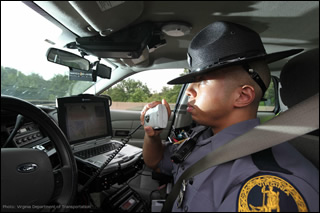
Feb 24, 2016
All Viewpoints Welcome in a Public Forum
The ACLU of Virginia commends the Jefferson-Madison Regional Library Board of Trustees for its recent decision to create a new Freedom of Speech case for public displays at Charlottesville’s Central Branch.Previously, the library had required such displays be “age appropriate” and “balanced in their presentation of public issues.” This suggested that decisions about displays by the library (a government agency) would be content or viewpoint driven. The library’s board was forced to re-examine that policy after some patrons complained about a pro-abortion rights display sponsored by the Charlottesville chapter of the National Organization for Women.Last week, the board actually widened its policy, rightly recognizing that free speech must include discussion of challenging and even divisive issues, such as religious, political and social messages. The new display case will be in an area that only adults use and placed at least 20 feet from the front door. Only obscene, defamatory or material that incites is prohibited.While certain displays might continue to offend some patrons’ sensibilities, it should be clear now that the library has created a public forum. Its contents represent the views of their sponsors and not the library or government. Should anti-abortion advocates choose to exercise their right to free speech, they can take a turn sharing a message in the display case.When government creates a public forum, all viewpoints are welcomed. Kudos to the library board for understanding that opening up rather than contracting the forum is the right way to ensure free speech.

Feb 17, 2016
Granting Special Rights to Certain Beliefs: Limiting Freedom
The following op-ed was published in the Richmond Times-Dispatch on Feb. 17, 2016.Proponents of two bills still under consideration in the Virginia General Assembly — Senate Bill 41 (SB 41) and House Bill 773 (HB 773) — say they are necessary to shield religious believers from persecution or prosecution.In fact, both bills either arm some, and only some, believers with a government sword to force their beliefs on others, or accord an unconstitutional government preference to some believers.No case has been cited, no facts reported, no evidence adduced that there is any real or imminent threat to religious freedom in Virginia. No legislation is necessary to protect Christian churches and other faith communities or any religious leader from being “forced” to marry people in their faith tradition when doing so would be inconsistent with the tenets of their faith.The First Amendment and the Virginia Statute for Religious Freedom are strong walls against any such action by government. The Virginia Religious Freedom Restoration Act passed in 2007 provides additional protection against any government action that “substantially burdens” anyone’s exercise of their faith.Why then is legislation being proposed, and what would be its effect?SB 41 offers those given the privilege of “solemnizing” a marriage on behalf of the state (a civil act) the authority to discriminate among people for whom they would provide that service based on any “sincerely held religious belief.” The bill would accord this privilege to discriminate not just to faith leaders who seek the authority to solemnize civil marriages, but to every judge and any person who obtains a court order allowing them to solemnize marriages on behalf of the state.It would not “burden” anyone’s free exercise of religion to require anyone who wants the authority to solemnize marriages on behalf of the state to do so without discrimination. Faith leaders would still be able to choose freely to perform or not to perform the religious rite of marriage without any state involvement, and people married by a faith leader or in a religious tradition that chooses not to marry certain people or couples could go to a judge or other civil authority to get their marriage solemnized for purposes of state recognition.SB 41 also says any religious organization or any unspecified organization “operated in connection with a religious organization” cannot be required to provide any “services, accommodations, facilities, goods, or privileges for a purpose related to the solemnization of any marriage.” The bill doesn’t say this is related to the performance of the religious “rites” of marriage. It refers to the solemnization of the marriage civilly, which is a state action.This conflation and confusion of civil and religious marriage is purposeful. It leads to a broad grant of authority to discriminate based on religion in conducting a public function or offering services or goods related to a public function. No burden on the free exercise of anyone’s religion would exist if the right to discriminate was not authorized.HB 773 seeks to grant a special and even broader privilege to discriminate, and a private cause of action to enforce that right only to people who hold certain religious beliefs regarding same-sex marriage, premarital sex, and the definition of gender. The bill states the protections afforded this select group of believers would be “in addition to the protections provided under the United States Constitution, the Constitution of Virginia, and federal and state law.”This grant of special rights is clearly an unconstitutional establishment of religion that prefers one set of beliefs over all others.The Supreme Court of the United States has said “(t)he clearest command of the Establishment Clause is that one religious denomination cannot be officially preferred over another.” The court also has emphasized that “(t)his prohibition is absolute.” Any rule or law that purports to treat certain religious beliefs differently (and more favorably) than others must, at a minimum, be justified by a compelling governmental interest, and be closely designed to further that interest.The Virginia Constitution also expressly protects the “right to be free from any governmental discrimination upon the basis of religious conviction …”, Art. I Section 11. This also commands strict scrutiny of a statute, like this one, that creates a preferred status for certain beliefs over others.No compelling interest can be articulated to support passage of legislation creating special rights and legal causes of action only for people who have certain specified beliefs about sex and marriage. Passage of such legislation would constitute an establishment of religion. When government has a religion, we are all less free to believe.
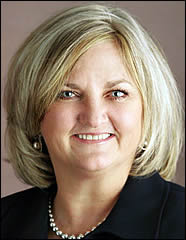
Feb 09, 2016
Do You Want Our Business or Would You Prefer We Take it Elsewhere?
Note: This is the last in a five-part series featuring Virginians whose rights would be directly affected by anti-LGBT bills now under consideration in the state legislature. All writers participated in a joint news conference held by the ACLU of Virginia and Equality Virginia at the Virginia Capitol on Jan. 19, 2016. It reflects the author’s views and not necessarily those of the ACLU of Virginia.By Philip CrosbyMy name is Philip Crosby and I have been working as a leader in Virginia’s thriving arts and culture industry for over 30 years.Recently I had the honor and the privilege to help present to Governor McAuliffe the findings of the LGBT Tourism Task Force, a group of over 20 professionals gathered from across the Commonwealth to recommend strategies to increase the number of tourists coming to Virginia and to increase the amount of money spent by tourists in the Commonwealth.Like every state and jurisdiction, our beloved Commonwealth is judged by our visitors, as well as by conference and meeting planners, tourism operators, business leaders and prospective students and scholars for its legal, social and welcoming climate. Do you want us here? Will we be treated with open arms, or with cold indifference or worse, open hatred? Do you want our business or would you prefer we take it elsewhere?Just last year, a so-called Religious Freedom Restoration Act passed by Indiana’s state legislature threatened to bring tourism in Indianapolis to a standstill, caused corporations to cancel expansion plans and forced large conferences and events to pull out of the city. Indianapolis had a major public relations debacle on its hands, one that cost it millions of dollars. No one would want to see that happen in Roanoke, in Norfolk or in Richmond.Nationwide public opinion polls tell us that the majority of Americans believe that no one should be turned away from a business based on their sexual orientation or gender identity, and yet, alarmingly, a record number of bills that would do just that – legalizing discrimination in commerce and public life – have been introduced during this session of the General Assembly.Is that what we want in Virginia? Do we want to create an atmosphere that says, “Please don’t come here, please don’t work here, please don’t spend your money here”? Not only is that a Virginia we don’t want, that is simply not a Virginia that we can afford.I urge the General Assembly to ensure that Virginia welcomes all its visitors and assures all its residents that wants them to visit here, live here, work here and spend their money here.As a matter of principle and an unshakeable commitment to promoting hospitality and tourism here, we must keep Virginia open for business for all.
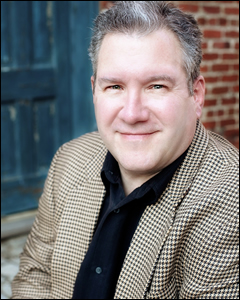
Feb 08, 2016
Some Virginia Lawmakers Flunk High School Civics
By Charlie Schmidt, Public Policy Associate, & Gail Deady, Secular Society Women's Rights Legal FellowA few of the part-time legislators who represent us at the Virginia General Assembly seem to be confused about how government works. They seem to think that the state can tell the federal government what to do. Any high school civics student could teach them a lesson (or two). Follow along.First, state law cannot conflict with federal law – that’s because of a little provision in the U.S. Constitution called the Supremacy Clause. We all learned in high school that this rule means federal law trumps conflicting state law -- every time and all of the time.The federal law now in play is Title X of the Social Security Act. Under Title X, the federal government gives states money to offer family planning programs through a variety of clinics, hospitals, and public health facilities. The feds have rules that govern who can participate – Planned Parenthood follows them.Several lawmakers are attempting to pick and choose who can get Title X funding. They are trying to legislate Planned Parenthood out of the federal program, HB 1090 (Del. Ben Cline, R-Amherst).Virginia lawmakers, take note: if you pocket federal money, you have to follow federal rules.Why do so many state lawmakers need a lesson in Civics 101? They seem to be ready to use any tactic, no matter how far-fetched, to punish Planned Parenthood for providing legal abortion services to women. They will take any action (legal or not) that they believe will help drive Planned Parenthood out of business. They want to do this even though that would deny many women with limited resources access to a full range of other essential health care services.The legislators’ allies in the fight are even willing to commit fraud to damage Planned Parenthood’s reputation and to lure women into unlicensed pseudo-clinics that invade their privacy and subject them to heavy handed anti-abortion counseling.Planned Parenthood, in contrast, has been absolved of any wrongdoing, repeatedly.The delegates’ response? They advanced HB 1090.Could some Virginia 11th grader please read these lawmakers a few chapters from a basic government textbook?

Feb 04, 2016
An Undeniable Truth: All Virginians are Created Equal
Note: This is the fourth in a five-part series featuring Virginians whose rights would be directly affected by anti-LGBT bills now under consideration in the state legislature. All writers participated in a joint news conference held by the ACLU of Virginia and Equality Virginia at the Virginia Capitol on Jan. 19, 2016. It reflects the author's views and not necessarily those of the ACLU of Virginia.By Michael Thorne-Begland Vice President for ROSMY and LGBTQ Youth OrganizationFounded in 1991 in Richmond, Virginia, ROSMY’s mission is to ensure equal opportunities for success for Virginia’s lesbian, gay, bisexual, transgender, and questioning (LGBTQ) youth through access to support, education, and advocacy. ROSMY continues to be the only organization in the area that directly addresses the unique needs and the healthy social development of LGBTQ youth ages 11-20. It offers weekly youth support meetings, sensitivity training for professionals, educational resources, youth leadership initiatives.You can find additional information about ROSMY at www.ROSMY.ORGMartin Luther King said that darkness cannot drive out darkness; only light can do that.So today we are here to shine a light on the attempts of several lawmakers to enshrine in the laws of the Commonwealth a narrow, ignorant view of what it means to be lesbian, gay, bisexual and transgender.In the past several years - truth has been on the march – in this Commonwealth and around the country. In her triumph over ignorance, truth has repeatedly shown us that all Virginians are created equal. Every lesbian girl, every gay boy, every bisexual youth and every transgender child is created equal. That simple truth, unsettling to some, will no longer be denied.The onslaught of proposals to enshrine anti-gay bias in our laws is a reaction to this simple truth and highlights the darkness that grips some Virginians – a darkness fueled by lies passionately preached by some and eagerly repeated by the small-minded.Victoria Cobb and others say Virginia’s LGBT youth are broken – ignoring the amazing lives of tens of thousands of LGBT youth in Virginia who each day show us LGBT youth are just as capable, just as successful, just as kind and human and goofy and caring and smart and driven as their peers.Theirs is a lie passionately preached by some and eagerly repeated by the small-minded.They say Virginia’s LGBT youth are predators and a threat to other youth – ignoring statistics that show LBGT youth are much more likely to be bullied than their straight and cisgender counterparts.Theirs is a lie passionately preached by some and eagerly repeated by the small-minded.They say a trans-child’s need to use a bathroom appropriate for their gender places other youth at risk – fabricating deranged scenarios where such an act – using a bathroom appropriate for your gender, creates risk for others.Theirs is a lie passionately preached by some and eagerly repeated by the small-minded.They say that laws like those proposed this year aren’t about discriminating; they are about protecting. These are the same people who said the institution of marriage would be devalued if our marriages were fully recognized. They said our military would be less effective if we allowed our LGBT soldiers to serve honestly. They say that religious freedoms will be trampled if LGBT Virginian’s enjoy the same rights as others.These are their lies, passionately preached by some and eagerly repeated by the small-minded.Truth, in the hearts and minds of Virginians and etched on the pages of our recent past, has shown Victoria Cobb and others like her for what they are. And year after year, their darkness is leaving our schools and our churches and our workplaces and our general assembly. It is leaving, but it is not gone. Their darkness will not be driving out with darkness, but with light.So today we are here to shine a light on the attempts of several lawmakers to enshrine in the laws of the Commonwealth, a narrow, ignorant view of what it means to be lesbian, gay, bisexual and transgender, and speak our simple, undeniable truth thatWe support the efforts of the ACLU of Virginia and Equality Virginia and other fair-minded Virginians who support equality for all.
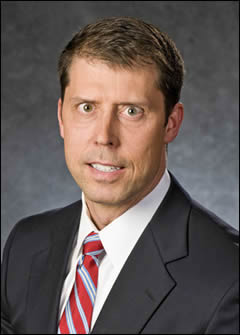
Feb 01, 2016
Gender isn't What is in Your Pants. It's What's Between Your Ears.
Note: This is the third in a five-part series featuring Virginians whose rights would be directly affected by anti-LGBT bills now under consideration in the state legislature. All writers participated in a joint news conference held by the ACLU of Virginia and Equality Virginia at the Virginia Capitol on Jan. 19, 2016. It reflects the author's views and not necessarily those of the ACLU of Virginia.By AmyI have to say, I never imagined that I would be a part of a press conference. Especially one that had anything to do with politics. Up until the last year, the type of politics I got involved with were debates between my children on who got to pick the radio station in the car.But here I am today, both proud and saddened to stand before you. Proud, because today I get to tell you about my amazing daughter. She's brave, beautiful, smart, sassy, and so very strong.Saddened, because across the street at the General Assembly, there are bills being considered that target her, try to segregate her, and potentially endanger her.Transgender rights are human rights, and today I am here to advocate for my daughter and the rights of all transgender youth like her in Virginia.This is not a trivial situation. Going to school every day is an act of courage by my daughter. There, she is required to use a separate bathroom, off of a closet. Which takes her 5 extra minutes every trip to get to, taking time away from her education.Delegate Cole's House Bills 663 and 781 seek to further alienate, segregate, and potentially criminalize our transgender youth and the transgender community as a whole. In a school setting, these bills set the stage for intolerance. It turns peers into the potty police, equiring students to complain anytime they THINK someone of the opposite gender uses their restroom.In a public setting, this puts my young daughter in danger. Her choice will be to share a restroom with men. Or use the women's restroom, where she is safe, and potentially face a fine and a visit by a police officer.Since I would never allow my daughter in the men's bathroom alone, I would have to accompany her. Then I also would be placed in a potentially dangerous situation, and faced with a fine.You see, gender isn't what is in your pants. It's what's between your ears. And anyone who saw my daughter enter a men's bathroom would be quite confused and hopefully, concerned.All over the United States, we have schools that protect, and respect a student’s gender identity. And not a single reported incident. In Virginia, we are seeing more and more schools take a stand to protect transgender youth and staff. And much of our community supports these moves!Mr. Cole's bills seeks to destroy that work and support.I want my daughter to have a successful school experience. Part of that is feeling supported, respected, valued, and safe. Her school experience should not include bathroom monitors ensuring her anatomical sex. Going to the grocery store with my children should only require my purse, my list, and if my children are with me, my patience. It should not require a copy of our birth certificates.These bathroom bills are discriminatory, and unnecessary.
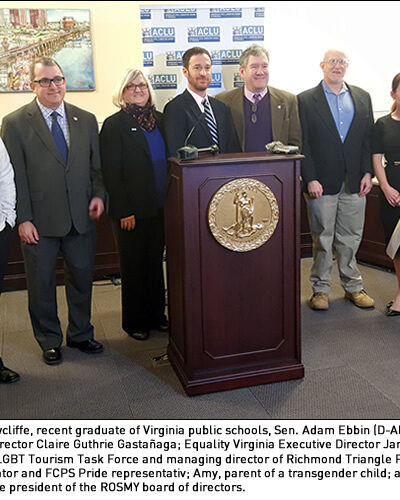
Stay Informed
Sign up to be the first to hear about how to take action.
By completing this form, I agree to receive occasional emails per the terms of the ACLU’s privacy statement.
By completing this form, I agree to receive occasional emails per the terms of the ACLU’s privacy statement.
